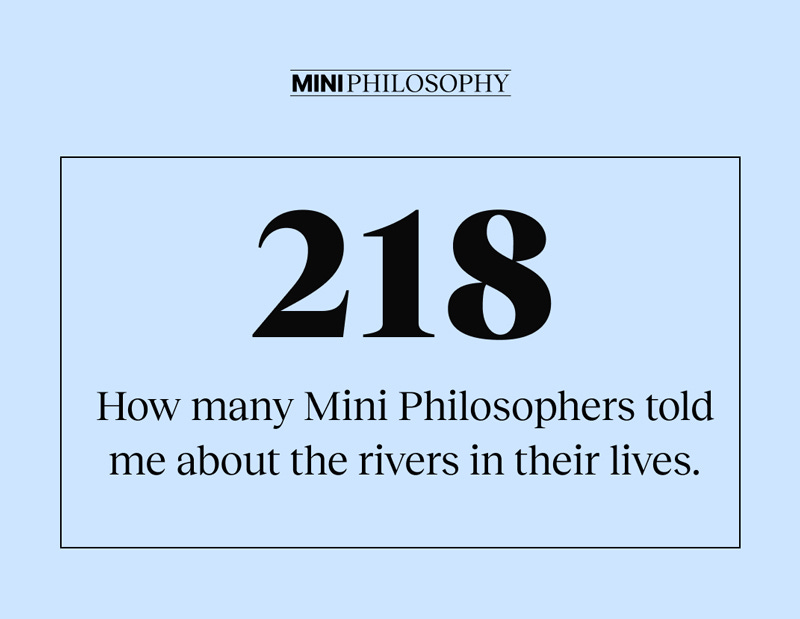Hello everybody,
This week we’re looking at rivers with the award-winning, bestselling nature writer, Robert Macfarlane.
You can find the companion article here: You cannot put the wind in a bag: How we learned to see nature
My grandmother died seven years ago.
Growing up, we would often drive the two hours along the coast to my grandparents’ home in Brighton. I remember waking up to the obnoxious cawing of seagulls, and my dad would let me buy a new computer game from Virgin Megastores. I lived with Nana for a year just after university, and if I close my eyes, I can see her face and hear her voice. Sometimes, I will smell her perfume on some stranger, and she is reincarnated for a second.
My grandad died when I was five. I was too young to know what death meant, and I was too young to really form an idea of my grandad. I’ve been told stories and shown photos, but my grandad exists as a kind of formless ghost — he lives in my memory like the wobbly, shimmering things of the imagination. I cannot remember my grandfather.
Or so I thought. Earlier this year, I spoke with the award-winning, bestselling nature writer Robert Macfarlane about his new book, Is A River Alive?, and he asked me a question: “What have been your rivers?” It was such an oddly piercing question that, at the time, I stammered and blustered my way through some suitably philosophical metaphor. Then, a few days later, I let the question sink in. What have been my rivers? Well, I’m a coastal boy at heart, so my “rivers” have been salty and bankless. The sea is my water of choice. But then, like some Niagara cascade, something came.
There was a tiny, tinkling brook that ran through my grandad’s garden, tiny enough to play in when you’re five. And on that river, other memories flow: the garden, the house, my parents, a small yapping dog, and the laughter of two Thomson brothers dancing through a brook with cold feet.
It turns out that I do have a river.
Relearning the old names
If you spend any sustained length of time around nature – the proper kind of nature without cars motoring in the distance or streetlights smothering the stars – then you will feel a presence. At first, it’s a small thing, sinister perhaps, but only in how alien it is. It’s that prickling sensation of eyes watching you. Hairs standing up, nervous but not scared. Then, the presence will deepen. The trees around you look down at you. The wind speaks in a blustery tongue. The river lives.
At this point, there is a struggle. A part of your being will resist. The rational, scientific, and utterly reasonable part of your mind will tell you to calm down a bit. Stop being so hippy. Stop being so childish. There’s nothing magical or mystical about any of this. A river is just lots of water, and a tree is nothing but a photosynthesizing machine.
Nature pushes for recognition, and you push back.
The child you were wouldn’t push back, of course. The child you were would accept all this without any struggle whatsoever. It makes perfect sense to a child that a river can be a spirit, that birds can read your thoughts, or that a tree can be as good a friend as anyone at school. There is such an obvious vitalism to the natural world that it takes years of wilful deafness and “Stop being so silly, child!” to unlearn it. We are taught to resist nature.
In many ways, Macfarlane’s new book is an account of the moment he surrendered that rationalistic, hierarchical, us-and-them resistance.
“So, my wish was really only to transcribe as truly as I could what happened then. And in part, it was being written by the river. I felt very, very strongly all the way through the book that the rivers were my collaborators and my co-authors, and I mean that non-trivially. But there was this point [on the banks of the Mutahekauhipu River in Canada] that I felt as though words were being moved into my skull and onto the page of the notebook, and that it is still blotted with the river water from that moment. It was terrifying. It was also extraordinary. And we had no warning.
So, yeah, there was an encounter there which I will never come to terms with and have sought to, as it were, allow the river's tongue to speak insofar as it is able in transliterated human language.”
For Rudolph Otto, the “numinous” is a kind of mystical experience where you are both humbled and awestruck by the presence of something incomprehensibly vast. The numinous is the terrible but intoxicating pull toward a force that consumes your sense of self. What Macfarlane is talking about is a kind of numinous experience. It’s one that recognizes the power, intensity, but most of all, animacy of the natural world.
The numinous is a mystical experience that becomes religious when the mind sits down to sort it into categories much later on. That feeling of “other” is given a label that fits neatly within an existing belief system or spiritual paradigm. But Macfarlane’s point is that this kind of numinous recognition of nature is far more primal and far more basic than that.
A part of our being wants to take its place within nature. A part of us aches when we shut our eyes to the trees or our ears to the wind. A part of us finds it incomprehensibly silly to say a river is “just” flowing water. Reading Macfarlane’s book releases that part of yourself. It lets you entertain those “childish” thoughts that are actually very serious. It brings you back into nature again – a nature not of fisheries, sewage systems, and hydroelectric power, but one with life. It reintroduces you to the old names long forgotten.
IN YOUR OPINION
I had an unexpected deluge of responses this week. Rob had told me in our interview (and he mentions it in his book) that most people have a river that they are fond of – a river that is important to who they are, even. And this week’s answers validate the point.
Here is one of my favorites. I leave it largely unedited and without much commentary, except to say how perfect an example it is of both how rivers are companions and part of our being.
The river that runs past where I live leads me up to a lake that I like to walk around. The river is an essential part of the walk, even though it appears to be heading in the opposite direction. When I struggle uphill, sweaty and panting, it flows downhill, seemingly effortlessly. Except not. It sometimes appears to struggle. It sometimes appears angry. It’s a very moody river, and though I've made that walk in joy as well as in deep despair, my moods are much more stable than the moods of the river. These days it carries snow; it's trying to help spring along (go!). But whatever the mood of the river, or of me, it's always deeply comforting to be in its presence. It always brings relief. I'm so grateful to this river for being such an important presence in my life.
– Ranja, Instagram.
Send me your thoughts via email or comment below.
Next Week:
Next week, we’re exploring totalitarianism with the Booker-prize winning author of Prophet Song, Paul Lynch. And so, I’m asking:
What do you think are the “red flags” of a country turning towards totalitarianism?
Send me your thoughts via email or comment below.
MINI READING LIST
The ten tactics of fascism - Big Think - Jason Stanley
RESOURCES
This newsletter contains my reflection on the topic at hand. Here is a list of the material shared in this email, as well as extra content about the topic that I've shared on my other social platforms:
The companion article inspired by my conversation with Robert Macfarlane
My short video about our connection with nature, featured on Big Think’s Instagram page
The full, unedited audio interview with Robert Macfarlane:
Jonny is the creator of the Mini Philosophy social network. He’s an internationally bestselling author of three books and the resident philosopher at Big Think. He's known all over the world for making philosophy accessible, relatable, and fun.
More Big Think content:
Big Think | Big Think Business | Starts with a Bang | Big Think Books










This is a beautiful writing that nearly brought me to tears. Living in rural northern California, my relationship with rivers is both seasonal and something I did not grow up with. It had to be learned, or rather, unlearned, for me, how to connect to them. I grew up in the urban environment of Chicago. I assumed all rivers were lined with concrete all the way along. Or at the very least, surrounded by flat, developed agricultural land that was fenced on all sides. I also inferred from my early experience that all rivers were polluted and frankly, gross. Being in one seemed like one of the worst things that could happen to a person, physically speaking.
When I moved to rural northern California over a decade ago, I remember the first time a group of (then-new) friends asked me, "do you want to go swimming in the river with us?" and I recoiled with disgust. "Isn't that gross?" I asked, but fortunately, my curious spirit prevailed and I went with them anyway. What I learned on that first glorious trip to the Van Duzen river was only the very beginning. I have since become a long-distance hiker (taking myself to rivers so pristine, they cannot be reached by any other means than on foot or by mule), general admirer of The Outdoors at large, and avid swimmer within wild bodies of water. Most recently I have taken up the practice of swimming in the Pacific Ocean without a wetsuit, which is entirely its own topic. But our local rivers will always hold an incredibly important place in my heart. They were the original catalyst in my now-lifelong process of "re-wilding" my spirit.
Rivers really are alive. They hold us, their water heals us, always moving, always having something to say. Supporting life on all levels, from the microscopic to the global. Persisting, and supporting our persistence, too. Reminding us that change is the only constant, and to appreciate the beauty of change rather than resist it. When I am in the Salmon River, my favorite river (don't tell her neighbors...!), I am overcome with that numinous feeling - a complete reverence takes over me, and I am simultaneously humbled to the core and lifted up with joy and aliveness. I have ditched the original instinct to push away from this magical feeling so completely that I now regularly daydream about my romantic and reverent feelings for these places and really only feel the most "me" when I am near them. It almost seems like...what are we doing when we /aren't/ making pilgrimage to these places? Isn't that what it's all about? The rest of life is just mish mosh. The rivers are the place to be.
Thank you for the beautiful piece. It resonates deeply with me. I know these feelings well; how gratifying it is to read about them and how they appear for you and others.
Beautiful. It reminded me of LM Montgomery who wrote in a way that made nature alive with its own unique personality. I’d forgotten what it was like to surrender to nature even though it was instinctive when I was young. Thank you for reminding me.